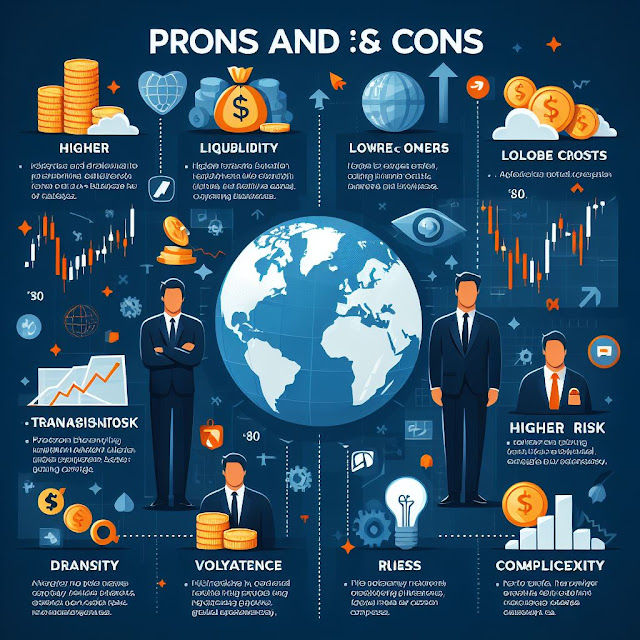Advantages and Disadvantages of Forex Trading
Navigating the Forex Seas
Unveiling the Advantages and Disadvantages of Forex Trading
In the vast ocean of financial markets, Forex trading has emerged as a powerful vessel for individuals seeking opportunities in the dynamic world of currency exchange. As with any venture, Forex trading comes with its distinct set of advantages and disadvantages. This comprehensive exploration aims to illuminate the pros and cons of navigating the Forex seas, empowering traders with a nuanced understanding of the risks and rewards inherent in this complex financial landscape.
Advantages of Forex Trading: Sailing Towards Opportunity
1. High Liquidity
Forex stands as the most liquid financial market globally. The immense trading volume ensures that traders can buy and sell currencies with ease, often at the click of a button, minimizing the risk of price manipulation.
2. Accessibility and Flexibility
Forex markets operate 24 hours a day, five days a week, providing unparalleled accessibility. Traders can engage in currency transactions from virtually anywhere with an internet connection, offering flexibility that traditional markets may lack.
3. Low Transaction Costs
The cost of trading in Forex is relatively low compared to other financial markets. Brokers typically charge a spread (the difference between buying and selling prices), and in many cases, there are no commissions or fees associated with transactions.
4. Leverage for Amplified Returns
Forex trading allows traders to utilize leverage, meaning they can control larger positions with a relatively small amount of capital. While this amplifies potential profits, it's essential to recognize the associated risks and the potential for magnified losses.
5. Diverse Trading Options
The Forex market offers a vast array of currency pairs, allowing traders to diversify their portfolios and explore various trading strategies. From major pairs like EUR/USD to exotic pairs, the options are extensive.
6. Profit Potential in Rising and Falling Markets
Unlike some traditional markets, Forex trading provides opportunities to profit in both rising and falling markets. Traders can take long (buy) or short (sell) positions based on their market analysis.
7. Information Accessibility
Real-time information and news that impact currency markets are readily available. Traders can stay informed about economic indicators, geopolitical events, and central bank decisions that influence currency values.
8. Demo Accounts for Practice
Many Forex brokers offer demo accounts, allowing novice traders to practice and refine their strategies in a risk-free environment. This hands-on experience is invaluable for building confidence and honing skills.
Disadvantages of Forex Trading: Navigating Choppy Waters
1. High Risk and Volatility
The very factors that make Forex attractive, such as high liquidity and accessibility, contribute to its inherent risk and volatility. Sudden market movements can lead to significant losses, especially when using leverage.
2. Psychological Pressures
The emotional toll of trading can be substantial. Fear, greed, and anxiety can cloud judgment and lead to impulsive decisions. Successful Forex traders must develop emotional intelligence and discipline to navigate psychological pressures.
3. Complexity of Market Analysis
Forex trading requires a deep understanding of market analysis, including technical and fundamental analysis. The complexity can be overwhelming for novice traders, necessitating a commitment to continuous learning.
4. Potential for Fraudulent Activities
As with any financial market, the Forex arena is not immune to fraudulent activities. Traders should exercise caution when selecting brokers and be aware of the risk of scams and unregulated entities.
5. Leverage Risks
While leverage can amplify profits, it also magnifies losses. Traders must use leverage judiciously and be aware of the risks involved. Overleveraging can lead to a rapid depletion of capital.
6. Lack of Investor Protections
Unlike trading on regulated stock exchanges, Forex trading lacks centralized oversight. Traders may not benefit from the same investor protections, and disputes with brokers can be challenging to resolve.
7. Time-Consuming Nature
Successful Forex trading requires time and dedication. Monitoring markets, analyzing data, and staying informed about global events demand a significant time investment, potentially leading to a work-intensive lifestyle.
8. Market Manipulation Risks
While the Forex market is generally transparent, the absence of centralized exchanges makes it susceptible to manipulation. Traders should be aware of the potential for market abuses and take precautions.
Strategies for Success: Navigating the Forex Seas Responsibly
1. Education and Skill Development
Investing in education is paramount. Traders should understand market analysis, risk management, and the intricacies of currency markets. Continuous skill development is crucial for navigating the complexities of Forex trading.
2. Risk Management and Discipline
Effective risk management is the cornerstone of a successful Forex trading career. Traders must set clear risk tolerance levels, use stop-loss orders, and adhere to disciplined trading plans.
3. Diversification and Balance
Diversifying trading strategies and portfolios is essential. Relying on a single currency pair or trading approach can expose traders to unnecessary risks. A balanced and diversified approach helps manage exposure.
4. Regulatory Compliance
Choosing reputable brokers in regulated jurisdictions is critical. Regulatory oversight provides a layer of protection for traders, ensuring fair market practices and dispute resolution mechanisms.
5. Stay Informed and Adaptive
The Forex market is dynamic, and staying informed is vital. Traders should stay abreast of economic indicators, global events, and market trends. Adaptability to changing conditions is key to long-term success.
6. Use Leverage Prudently
While leverage can enhance profits, it should be used judiciously. Traders must understand the risks associated with leverage and avoid overleveraging, which can lead to rapid and substantial losses.
Conclusion
Navigating the Forex Seas with Wisdom
In the vast and ever-changing seas of Forex trading, success requires a combination of education, skill, discipline, and resilience. The advantages of high liquidity, accessibility, and profit potential must be weighed against the challenges of risk, volatility, and psychological pressures.
For those embarking on the journey of Forex trading, the key lies in navigating these seas with wisdom. Responsible and informed decision-making, coupled with a commitment to continuous learning, empowers traders to harness the potential of the Forex markets while mitigating the associated risks. As traders set sail into these financial waters, a balanced and strategic approach ensures a steady course in the pursuit of success in the captivating world of Forex trading.








